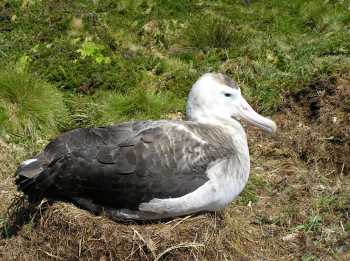A Senior Research Assistant and two Research Assistants are required for island restoration work on Gough Island, Tristan da Cunha, South Atlantic Ocean, a World Heritage Site. Field work will include demographic monitoring of the Critically Endangered and near-endemic Tristan Albatross Diomedea dabbenena, as well as of four other species of ACAP-listed albatrosses and petrels. Details of the three posts follow.

Female Tristan Albatross incubating on Gough Island, photograph by John Cooper
A long-running research and conservation management project requires three people to work on Gough Island for 13 months, with an additional month for training in Cape Town, South Africa prior to departure. These contract positions are designed primarily to conduct annual monitoring of breeding seabirds (two positions), and control an invasive plant, the Procumbent Pearlwort Sagina procumbens (one position; one of the other Research Assistants will also be trained in Sagina work, including rope access).
The seabird monitoring positions are responsible for annual monitoring of breeding success, survival, population counts, and other field work for 14 breeding species throughout the entire year. The Sagina position is responsible for control and eradication work on Sagina from the steep cliffs adjacent to the weather station on Gough Island. If required, training in rope-access techniques (IRATA Level 1 or equivalent) will be provided prior to departure to Gough Island for two team members.
The candidates will be joining and living with the South African National Antarctic Programme (SANAP) overwintering team of six people in a weather station, and will also be required to work within the requirements of SANAP’s overwintering team. It will be an asset if the post holders have prior experience of working with one or more other team members.
Requirements – Monitoring (2 positions)
The successful applicants should have experience in:
- Bird banding, safe handling of birds
- Conducting surveys and censuses of breeding seabirds
- Managing large amounts of data
- Undertaking fieldwork in a mountainous environment and inclement weather conditions
- Additional skills that would benefit a candidate include
- Banding/ringing permit
- Blood sampling, attaching biologging devices
Post-graduate research degree.
Requirements – Sagina (1 position)
The successful applicant should have experience in:
- Abseil rope-access techniques, and/or rock climbing experience
- Undertaking fieldwork in a mountainous environment and inclement weather conditions
- Working on remote islands (or equivalent remote locations).
Additional skills that would benefit a candidate include alien plant eradication techniques.
Requirements – all positions
Applicants must demonstrate:
- An ability to live and work in a very small team on one of the world’s most remote islands for a prolonged period
- High levels of physical fitness, adaptability and a strong work ethic
- Aptitude and/or proven experience in successfully undertaking unsupervised fieldwork, with safety as a first priority.
The successful applicants will have skills/qualifications:
- A degree or equivalent qualification or experience in a science/conservation discipline, ideally with some work experience in conservation/wildlife-related fieldwork and research
- Details of the jobs:
- Conduct fieldwork according to a work-plan devised by the project managers
- Assist biological research, Sagina control, fieldwork and monitoring as required
- Make day-to-day decisions about work priorities and fieldwork protocols
- Maintain accurate records of the work and computer databases of the work
- Regularly report to and update the project managers on progress (Senior Research Assistant only)
- Be responsible for data quality and reporting, and on-site training as needed (Senior Research Assistant only).
Salaries: UK£ 10 600 (Research Assistant), UK£ 14 500 (Senior Research Assistant) for 15 months, plus transport, food, and accommodation.
Period: 25 July 2015 – 25 October 2016.
How to apply:
Send a cover letter outlining your experience and qualifications, CV and contact information (including telephone numbers) for three references as a single PDF document to Dr. Alex Bond (
John Cooper, ACAP Information Officer, 31 May 2015

 English
English  Français
Français  Español
Español